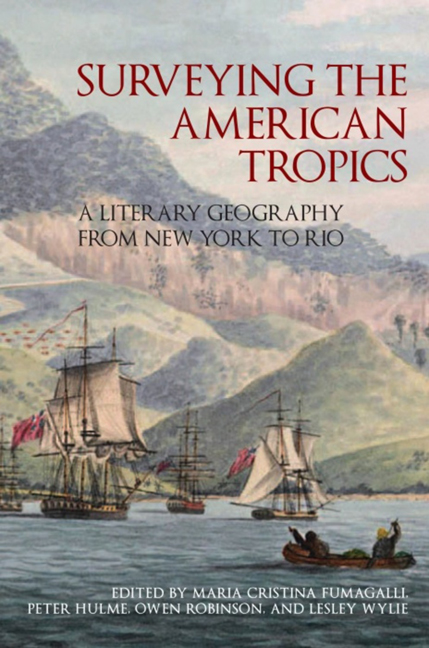Book contents
- Frontmatter
- Dedication
- Contents
- List of illustration
- Introduction
- A Tree Grows in Bajan Brooklyn: Writing Caribbean New York
- Reading the Novum World: The Literary Geography of Science Fiction in Junot Díaz's The Brief Wondrous Life of Oscar Wao
- Inventing Tropicality: Writing Fever, Writing Trauma in Leslie Marmon Silko's Almanac of the Dead and Gardens in the Dunes
- Imperial Archaeology: The American Isthmus as Contested Scientific Contact Zone
- Space Age Tropics
- Black Jacobins and New World Mediterraneans
- The Oloffson
- Dark Thresholds in Trinidad: Regarding the Colonial House
- Micronations of the Caribbean
- Golden Kings, Cocaine Lords, and the Madness of El Dorado: Guayana as Native and Colonial Imaginary
- Suriname Literary Geography: The Changing Same
- The Art of Observation: Race and Landscape in A Journey in Brazil
- Notes on Contributors and Editors
- Index
Introduction
- Frontmatter
- Dedication
- Contents
- List of illustration
- Introduction
- A Tree Grows in Bajan Brooklyn: Writing Caribbean New York
- Reading the Novum World: The Literary Geography of Science Fiction in Junot Díaz's The Brief Wondrous Life of Oscar Wao
- Inventing Tropicality: Writing Fever, Writing Trauma in Leslie Marmon Silko's Almanac of the Dead and Gardens in the Dunes
- Imperial Archaeology: The American Isthmus as Contested Scientific Contact Zone
- Space Age Tropics
- Black Jacobins and New World Mediterraneans
- The Oloffson
- Dark Thresholds in Trinidad: Regarding the Colonial House
- Micronations of the Caribbean
- Golden Kings, Cocaine Lords, and the Madness of El Dorado: Guayana as Native and Colonial Imaginary
- Suriname Literary Geography: The Changing Same
- The Art of Observation: Race and Landscape in A Journey in Brazil
- Notes on Contributors and Editors
- Index
Summary
Most literary histories are written in lockstep with national stories. It is perfectly clear what such co-ordination brings to nationalism: it makes that national story deeper and longer, more rooted in its territory. It is less clear that literary history benefits. For a start many of the books herded into such national literary histories were written long before these nations ever existed: to read, say, the writings of Christopher Columbus as part of US literature is to misplace the historical and geographical co-ordinates necessary to understand Columbus. But even within the modern era, dominated by nation-states, literature itself has rarely been disciplined by national borders. Other ways of organising can tell different stories, which can perhaps persuade us to look in different ways at the multiplicity of texts available for the writing of literary history.
In this regard the American continent offers some fine complexities, from indigenous cultures which pre-date the European invasion, through the ever-shifting pattern of colonial settlements and struggles for independence, to the present mosaic of nation-states and notional supra-national designations such as ‘Latin America’, ‘Anglo-America’, and ‘the Caribbean’, not to mention the constant patterns of migration which have created categories like Cuban-American and Nuyorican, with writers who might belong to two or three national territories—or perhaps to none at all.
In recent years new formulations have suggested some different configurations: the idea of the Black Atlantic has emphasised connections across that ocean, particularly between Africa and America; various new versions of ‘southern’ literature have rediscovered connections between the southern US states and the islands of the Caribbean; and the Caribbean itself has expanded to include the coastal regions of Colombia and Venezuela. One major difference between these new formulations and the older national literary histories is that whereas previously writers might be struggled over—is T. S. Eliot a US or an English poet? is Paule Marshall a West Indian or a US novelist?—the new configurations are not mutually exclusive: each optic can in theory reveal a different set of relationships and trajectories. Taken together they help produce a richer literary history.
- Type
- Chapter
- Information
- Surveying the American TropicsA Literary Geography from New York to Rio, pp. 1 - 21Publisher: Liverpool University PressPrint publication year: 2013



